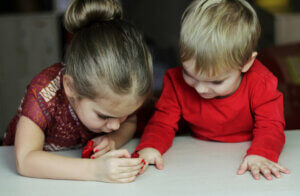My Son Wants to Paint His Nails

Unfortunately, even now in the 21st century, society is still holding on to many stereotypes regarding gender. Therefore, a great number of children grow up assuming certain roles, adopting certain “feminine” or “masculine” behaviors, according to their gender.
But, what happens if they don’t accept the psychological, social, or cultural characteristics that society attributes to their sex? For example, what happens if a boy wants to paint his nails? Why shouldn’t we allow him to? Would it make him any less of a man?
Currently, education about equality is the order of the day. So why are there still many prejudices and stereotypes regarding a person’s sexual orientation or gender? Future generations need to grow up in an environment that allows them to develop their own personality, without the imposition of absurd rules.
“The problem with gender is that it prescribes how we ‘should’ be rather than recognizing how we are.”
– Chimamanda Ngozi Adichi –

Eradicating gender roles and stereotypes
It’s fundamental that we completely eradicate gender roles and stereotypes in order for children to grow up happy and free. But, what do these stereotypes mean? According to Cynta Cayetano and Olga Tena, we can define gender stereotypes as follows:
“Preconceived and built-in ideas during the socialization process, ideas that we learn from the time we’re children, regarding the vital essence of and the differences between men and women, which are characterized by their simplification and their ability to be accepted, are simple and do not correspond to an analysis of individuals.”
– Cynta Cayetano and Olga Tena –
At the same time, these same authors define gender roles as follows:
“The different social functions assigned to men and women in the differentiated socialization based on gender stereotypes.”
– Cynta Cayetano y Olga Tena –
So, we continue to hear such retrograde remarks as “dancing ballet is for girls”… “Playing football is for boys”… “Only girls can play with dolls”… “Only boys can play with cars and trucks”…. “Princesses are for girls”… “Superheroes are for boys”…, etc.
Enough! Toys, interests, hobbies, and behaviors don’t belong to one sole gender. We can’t continue to allow the generations to come to grow up amid stereotypical beliefs that only serve to repress their behavior.
“Every child is assigned one category or another based on the shape and size of his or her genital organs. Once this assignment takes place, we become what culture thinks each person is – feminine or masculine. While many believe that men and women are a natural expression of a genetic map, gender is the product of culture and human thought, a social construction that creates the natural truth of every individual.”
– Gilber and Wesbster –

My son wants to paint his nails

The world is changing and advancing toward gender equality. In general, it continues to consider fingernail painting to be something only women should do. Just the same, there are more and more men that are joining in on the beauty practice. Therefore, believing that this is an exclusively feminine act is an old-fashioned and outdated belief.
So, if your son wants to paint his nails, there’s no reason to be afraid. It’s normal for children to want to imitate the behaviors they observe in their mothers, teachers, sisters, etc. What’s more, this means that your son has yet to adopt the gender stereotypes that society wants to impose.
So, don’t be the one to repress his behavior. Encourage him to be whatever he wants and help him to express himself freely. After all, what harm is there in painting his nails? None at all!
“The three scariest and most confusing words every man hears at some point in his lifetime are ‘Be a Man!’”
– Joe Ehrmann –
Unfortunately, even now in the 21st century, society is still holding on to many stereotypes regarding gender. Therefore, a great number of children grow up assuming certain roles, adopting certain “feminine” or “masculine” behaviors, according to their gender.
But, what happens if they don’t accept the psychological, social, or cultural characteristics that society attributes to their sex? For example, what happens if a boy wants to paint his nails? Why shouldn’t we allow him to? Would it make him any less of a man?
Currently, education about equality is the order of the day. So why are there still many prejudices and stereotypes regarding a person’s sexual orientation or gender? Future generations need to grow up in an environment that allows them to develop their own personality, without the imposition of absurd rules.
“The problem with gender is that it prescribes how we ‘should’ be rather than recognizing how we are.”
– Chimamanda Ngozi Adichi –

Eradicating gender roles and stereotypes
It’s fundamental that we completely eradicate gender roles and stereotypes in order for children to grow up happy and free. But, what do these stereotypes mean? According to Cynta Cayetano and Olga Tena, we can define gender stereotypes as follows:
“Preconceived and built-in ideas during the socialization process, ideas that we learn from the time we’re children, regarding the vital essence of and the differences between men and women, which are characterized by their simplification and their ability to be accepted, are simple and do not correspond to an analysis of individuals.”
– Cynta Cayetano and Olga Tena –
At the same time, these same authors define gender roles as follows:
“The different social functions assigned to men and women in the differentiated socialization based on gender stereotypes.”
– Cynta Cayetano y Olga Tena –
So, we continue to hear such retrograde remarks as “dancing ballet is for girls”… “Playing football is for boys”… “Only girls can play with dolls”… “Only boys can play with cars and trucks”…. “Princesses are for girls”… “Superheroes are for boys”…, etc.
Enough! Toys, interests, hobbies, and behaviors don’t belong to one sole gender. We can’t continue to allow the generations to come to grow up amid stereotypical beliefs that only serve to repress their behavior.
“Every child is assigned one category or another based on the shape and size of his or her genital organs. Once this assignment takes place, we become what culture thinks each person is – feminine or masculine. While many believe that men and women are a natural expression of a genetic map, gender is the product of culture and human thought, a social construction that creates the natural truth of every individual.”
– Gilber and Wesbster –

My son wants to paint his nails

The world is changing and advancing toward gender equality. In general, it continues to consider fingernail painting to be something only women should do. Just the same, there are more and more men that are joining in on the beauty practice. Therefore, believing that this is an exclusively feminine act is an old-fashioned and outdated belief.
So, if your son wants to paint his nails, there’s no reason to be afraid. It’s normal for children to want to imitate the behaviors they observe in their mothers, teachers, sisters, etc. What’s more, this means that your son has yet to adopt the gender stereotypes that society wants to impose.
So, don’t be the one to repress his behavior. Encourage him to be whatever he wants and help him to express himself freely. After all, what harm is there in painting his nails? None at all!
“The three scariest and most confusing words every man hears at some point in his lifetime are ‘Be a Man!’”
– Joe Ehrmann –
All cited sources were thoroughly reviewed by our team to ensure their quality, reliability, currency, and validity. The bibliography of this article was considered reliable and of academic or scientific accuracy.
- Borghetti, E. (2018). Sexualidad e Identidad de Género: lo que seguro debes saber. EEUU: e625.
- Cayetano-Salas, C. y Tena-Bernal, O. (2019). Guía de género: actividades para trabajar la igualdad de género con personas con discapacidad intelectual. Zaragoza: Atades (Asociación Tutelar Aragonesa de Discapacidad Intelectual).
This text is provided for informational purposes only and does not replace consultation with a professional. If in doubt, consult your specialist.








